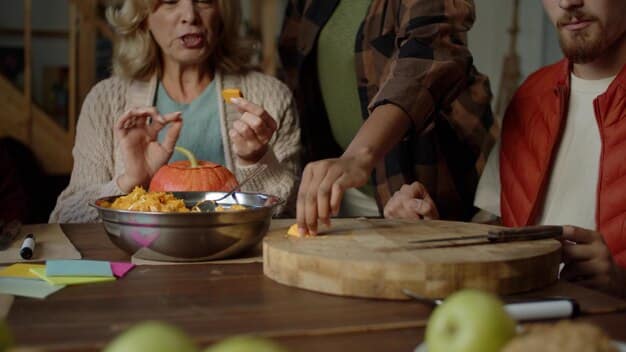Addiction Recovery: 6 Tips for a Sober Holiday Season

Addiction recovery can be particularly challenging during the holidays, but strategies like setting boundaries, planning sober activities, and seeking support can help individuals maintain sobriety and navigate festive gatherings successfully.
Navigating the holiday season can be tough, especially when you’re committed to addiction recovery: 6 tips for staying sober during the holidays are your guide to a joyful, substance-free celebration.
Prioritize Your Recovery This Holiday Season
The holiday season, while often joyous, can be a minefield for individuals in recovery. Parties, family gatherings, and the general festive atmosphere can create triggers and temptations that threaten sobriety. Understanding these challenges is the first step to navigating them successfully.
It’s important to remember that prioritizing your recovery isn’t selfish; it’s essential for your well-being and long-term happiness. These six tips provide a framework for staying sober and enjoying the holidays without compromising your commitment to recovery.
Identify Your Triggers
Holidays can bring a mix of emotions and familiar environments, making it crucial to identify what might trigger cravings or relapse. Knowing your triggers allows you to develop coping strategies and avoid high-risk situations.
Create an Exit Strategy
Before attending any holiday event, plan how you’ll handle cravings or uncomfortable situations. Having a pre-arranged exit strategy can provide a sense of control and prevent impulsive decisions.
- Recognize potential triggers in advance.
- Develop healthy coping mechanisms.
- Communicate your needs to supportive friends or family.
By being proactive and prepared, you can navigate holiday events with confidence and stay true to your recovery goals. Remember, your well-being is the priority.
Set Boundaries and Stick to Them
One of the most crucial aspects of maintaining sobriety during the holidays is setting clear boundaries. These boundaries involve communicating your needs and limitations to others and sticking to them, even when faced with pressure or discomfort.
Setting boundaries is not about being rude or antisocial. It’s about protecting your recovery and creating a safe environment for yourself. When you clearly define what you’re comfortable with, you empower yourself to stay sober and enjoy the holidays on your terms.
Communicate Your Needs Clearly
Let friends and family know that you’re not drinking or using substances. This prevents awkward situations and allows them to support your recovery.
Avoid High-Risk Situations
If certain environments or people trigger cravings, limit your exposure to them. Prioritize your well-being and avoid situations that could jeopardize your sobriety.

Setting boundaries is a continuous process. You may need to adjust them as situations arise, but the key is to remain firm and prioritize your recovery. Remember, you have the right to protect your sobriety.
Plan Sober Activities
The perception that holidays must revolve around alcohol or other substances can be a major challenge for those in recovery. Actively planning sober activities offers a refreshing alternative, allowing you to enjoy the festive season without compromising your commitment to sobriety.
Engaging in sober activities isn’t just about avoiding temptation; it’s about discovering new ways to celebrate and connect with loved ones. These activities can be just as enjoyable, if not more so, than traditional celebrations centered around substance use.
- Organize a holiday-themed game night.
- Volunteer at a local charity.
- Attend a festive concert or play.
By shifting the focus to sober activities, you can create lasting memories and enjoy the holidays in a meaningful and healthy way. Remember, the true spirit of the holidays lies in connection, joy, and gratitude, not in substance use.
Build Your Support Network
Recovery is rarely a solitary journey, and the holiday season underscores the importance of having a strong support network. Connecting with supportive friends, family, or recovery groups can provide encouragement, accountability, and a sense of belonging during a potentially isolating time.
Your support network is your lifeline when cravings or challenges arise. These individuals understand your journey and can offer practical advice, a listening ear, or simply a reminder of your strength and resilience. Don’t hesitate to reach out when you need support.
Attend Recovery Meetings
Meetings provide a safe and supportive environment where you can share your experiences and connect with others in recovery.
Connect with Sober Friends
Spend time with friends who support your sobriety and engage in activities that don’t involve substance use.
Building a robust support network is an ongoing process. Nurture your relationships and actively seek out connections with individuals who understand and support your commitment to recovery. Your support network will be invaluable during the holiday season and beyond.
Practice Self-Care
The holiday season can be incredibly stressful, with demands on your time, finances, and emotions. Amidst the hustle and bustle, it’s essential to prioritize self-care to manage stress and maintain your well-being. Taking care of yourself is not selfish; it’s a vital component of staying sober.
Self-care encompasses a wide range of activities that promote physical, mental, and emotional health. What works for one person may not work for another, so it’s important to identify activities that bring you joy, relaxation, and a sense of inner peace.
- Engage in regular exercise.
- Practice mindfulness or meditation.
- Get enough sleep.
By incorporating self-care into your daily routine, you can build resilience to stress and cravings, making it easier to navigate the challenges of the holiday season. Remember, taking care of yourself is an investment in your long-term recovery.
Embrace New Traditions
Holidays are often steeped in tradition, but these traditions can sometimes be associated with substance use. Embracing new traditions offers an opportunity to create fresh, sober memories and redefine what the holidays mean to you.
New traditions can be anything that aligns with your values and brings you joy. They can be as simple as starting a new holiday recipe, volunteering as a family, or taking a scenic hike. The key is to create experiences that are meaningful and enjoyable without involving substance use.

Start a New Holiday Recipe
Experiment with new cuisines or create healthy versions of traditional holiday dishes.
Volunteer as a Family
Give back to your community by volunteering at a local charity or shelter.
Embracing new traditions is an empowering way to reshape your holiday experience and create lasting memories centered around joy, connection, and sobriety. Don’t be afraid to break from the past and create a holiday season that truly reflects your values.
| Key Point | Brief Description |
|---|---|
| 🛡️ Set Boundaries | Communicate your limits to protect your sobriety. |
| 🎉 Plan Sober Activities | Engage in activities that don’t involve substance use. |
| 🤝 Build Support | Connect with supportive friends or recovery groups. |
| 🧘 Practice Self-Care | Prioritize your well-being through relaxation and healthy habits. |
Frequently Asked Questions
▼
Common triggers include family stress, parties with alcohol, financial pressures, and emotional memories associated with past holidays.
▼
Simply say, “No, thank you. I’m not drinking tonight,” or “I’m good, thanks.” You don’t owe anyone an explanation beyond that.
▼
Remove yourself from the situation, call a sober friend, or engage in a relaxation technique like deep breathing. Have a plan in place.
▼
Prioritize sleep, eat healthy foods, exercise, and schedule time for relaxation. Don’t be afraid to say no to extra commitments.
▼
Absolutely. Your sobriety is paramount. If an event poses a risk to your recovery, it’s okay to politely decline or leave early.
Conclusion
Staying sober during the holidays presents unique challenges, but by prioritizing your recovery, setting boundaries, and building a strong support system, you can navigate the festive season with confidence and enjoy a joyful, substance-free holiday season. Remember, your sobriety is the most precious gift you can give yourself.





